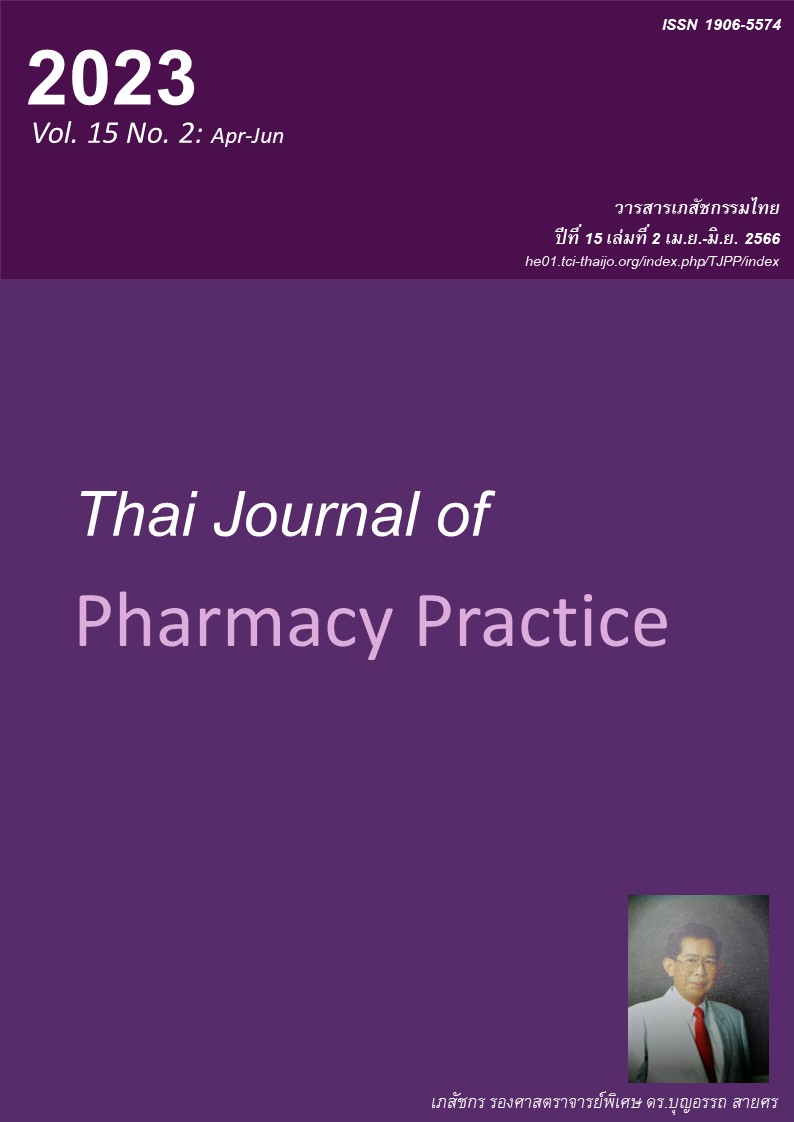ผลของการให้ความรู้ออนไลน์ต่อความรู้ในการใช้อุปกรณ์ ตวงยาน้ำและการบริหารยาสำหรับเด็กของผู้ปกครอง
Main Article Content
บทคัดย่อ
วัตถุประสงค์: เพื่อประเมินความรู้ของผู้ปกครองก่อนและหลังได้รับความรู้ทางสื่อออนไลน์เกี่ยวกับการใช้อุปกรณ์ตวงยาน้ำและการบริหารยาสำหรับเด็ก วิธีการ: การวิจัยเชิงทดลองแบบสุ่มซึ่งมีกลุ่มควบคุมครั้งนี้ทำในผู้ที่มีอายุมากกว่า 18 ปีขึ้นไปที่ทำหน้าที่ดูแลบุตรหลานอายุไม่เกิน 7 ปี กลุ่มทดลองได้รับสื่อความรู้ออนไลน์แบบรูปภาพพร้อมคำอธิบายเกี่ยวกับการใช้อุปกรณ์ตวงยาน้ำและการบริหารยาผ่านช่องทางแอพลิเคชันไลน์ (LINE) สัปดาห์ละ 1 ครั้ง เป็นระยะเวลา 3 สัปดาห์ ทั้งกลุ่มทดลองและกลุ่มควบคุมทำแบบประเมินความรู้ทางออนไลน์ก่อนเข้าการศึกษาและสัปดาห์ที่ 4 ของการเข้าการศึกษา ผลการวิจัย: ผู้เข้าร่วมการวิจัยทั้งสิ้น 141 คน โดยแบ่งเป็นกลุ่มควบคุมและกลุ่มทดลอง จำนวน 70 และ 71 คน ข้อมูลทั่วไปก่อนการศึกษาของทั้งสองกลุ่มไม่มีความแตกต่างกันอย่างมีนัยสำคัญ เมื่อสิ้นสุดการศึกษาพบว่า กลุ่มทดลองมีคะแนนความรู้เฉลี่ยสูงกว่าก่อนเข้าการศึกษาอย่างมีนัยสำคัญทางสถิติ (6.26+2.06 และ 8.91+1.20 คะแนน ตามลำดับ จากคะแนนเต็ม 10, P<0.05) และมีคะแนนความรู้เฉลี่ยสูงกว่ากลุ่มควบคุมอย่างมีนัยสำคัญทางสถิติหลังการแทรกแซง (8.91+1.20 และ 6.47+1.98 คะแนน ตามลำดับ, P<0.05) สำหรับคะแนนความรู้ด้านการเลือกอุปกรณ์ตวงยาน้ำ การแปลหน่วยวัดปริมาตร และการอ่านปริมาตรของกลุ่มทดลองสูงกว่ากลุ่มควบคุมอย่างมีนัยสำคัญทางสถิติเช่นกัน (P<0.05) ผู้ที่มีการศึกษาระดับมัธยมศึกษาหรืออนุปริญญา และกลุ่มปริญญาตรีขึ้นไปมีคะแนนความรู้มากกว่ากลุ่มประถมศึกษาอย่างมีนัยสำคัญทางสถิติ (P<0.05) กลุ่มทดลองมีความพึงพอใจต่อสื่อความรู้ออนไลน์ในภาพรวม 4.38+0.62 จากคะแนนเต็ม 5 คะแนน สรุป: การให้ความรู้ทางสื่อออนไลน์สามารถเพิ่มความรู้ในการตวงยาและการบริหารยาน้ำของผู้ปกครองอย่างมีนัยสำคัญทางสถิติ ซึ่งเป็นหนึ่งในช่องทางที่เภสัชกรสามารถใช้ในการให้คำแนะนำผู้ปกครองได้ ระดับการศึกษาของผู้ปกครองมีผลต่อการเข้าใจคำแนะนำ
Article Details

อนุญาตภายใต้เงื่อนไข Creative Commons Attribution-NonCommercial-NoDerivatives 4.0 International License.
ผลการวิจัยและความคิดเห็นที่ปรากฏในบทความถือเป็นความคิดเห็นและอยู่ในความรับผิดชอบของผู้นิพนธ์ มิใช่ความเห็นหรือความรับผิดชอบของกองบรรณาธิการ หรือคณะเภสัชศาสตร์ มหาวิทยาลัยสงขลานครินทร์ ทั้งนี้ไม่รวมความผิดพลาดอันเกิดจากการพิมพ์ บทความที่ได้รับการเผยแพร่โดยวารสารเภสัชกรรมไทยถือเป็นสิทธิ์ของวารสารฯ
เอกสารอ้างอิง
Boonrit N. Impact of ontogeny on pharmacokinetics and pharmacodynamics in pediatric patients. Thai Journal of Pharmacy Practice 2018; 10: 462-76.
Tzimenatos L, Bond GR. Severe injury or death in young children from therapeutic errors: a summary of 238 cases from the American Association of Poison Control Centers. Clin Toxicol (Phila). 2009; 47: 348-54.
Azar C, Allué D, Valnet-Rabier MB, Chouchana L, Rocher F, Durand D, et al. Patterns of medication errors involving pediatric population reported to the French Medication Error Guichet. Pharm Pract 2021; 19: 2360.
Peacock G, Parnapy S, Raynor S, Wetmore S. Accuracy and precision of manufacturer-supplied liquid medication administration devices before and after patient education. J Am Pharm Assoc 2010; 50: 84-6.
Simon HK. Caregiver knowledge and delivery of a commonly prescribed medication (albuterol) for children. Arch Pediatr Adolesc Med. 1999; 153: 615-8.
Yin HS, Dreyer BP, Ugboaja DC, Sanchez DC, Paul IM, Moreira HA, et al. Unit of measurement used and parent medication dosing errors. Pediatrics. 2014; 134: e354-61.
Simon HK, Weinkle DA. Over-the-counter medica tions. Do parents give what they intend to give? Arch Pediatr Adolesc Med. 1997; 151: 654-6.
Almazrou S, Alsahly H, Alwattar H, Alturki L, Alamri M. Ability of Saudi mothers to appropriately and accurately use dosing devices to administer oral liquid medications to their children. Drug Healthc Patient Saf. 2015; 7: 1-6.
Yin HS, Dreyer BP, Moreira HA, van Schaick L, Rodriguez L, Boettger S, et al. Liquid medication dosing errors in children: role of provider counseling strategies. Acad Pediatr. 2014; 14: 262-70.
Jittangwong J, Lerkiatbundit S, Kaewnopparat N. Measuring errors in pediatric liquid medication among caregivers: magnitudes and related factors. Thai Journal of Pharmacy Practice. 2018; 10: 477-93.
Saidum S, Pratheepawanit N. The effect of picto- grams on the understanding of the parents on the use of antibiotic dry syrup. Thai Journal of Pharmacy Practice. 2009; 1: 99-108.
Pan JF, Curran JA, Fitzpatrick E, Breneol S, Bennett C, Hurley KF. Interventions to assist parents and caregivers in accurately dosing liquid medications for their children: a scoping review. Drugs Ther Perspect 2019; 35: 230-40.
Patidar P, Mathur A, Pathak A. Can use of pictograms reduce liquid medication administration errors by mothers? An interventional study. BMC Psychol 2021; 9: 99. doi: 10.1186/s40359-021-0058 4-9.
Yin HS, Mendelsohn AL, Fierman A, van Schaick L, Bazan IS, Dreyer BP. Use of a pictographic diagram to decrease parent dosing errors with infant acetaminophen: a health literacy perspective. Acad Pediatr 2011; 11: 50-7.
Yin HS, Wolf MS, Dreyer BP, Sanders LM, Parker RM. Evaluation of consistency in dosing directions and measuring devices for pediatric nonprescription liquid medications. JAMA 2010; 304: 2595-602.
Joshi P, Bavdekar SB. Liquid drug dosage measure ment errors with different dosing devices. Ind J Pediatr 2019; 86: 382-5.
Yin HS, Mendelsohn AL, Wolf MS, Parker RM, Fierman A, van Schaick L, et al. Parents' medication administration errors: role of dosing instruments and health literacy. Arch Pediatr Adolesc Med. 2010; 164: 181-6.
Anon. NCPDP recommendations for standardizing dosing in metric units (mL) on prescription container labels of oral liquid medications, version 2.0. Am J Health Syst Pharm 2021; 78: 578-605. doi: 10.1093 /ajhp/zxab023.
Seo M, Kim HR. Effectiveness of an 'Integrated Medication Adherence Enhancement Program for Persons with Schizophrenia' by using online educa- tion contents. Korean J Psychopharmacol 2009; 20: 22-31.
Maeda E, Boivin J, Toyokawa S, Murata K, Saito H. Two-year follow-up of a randomized controlled trial: knowledge and reproductive outcome after online fertility education. Hum Reprod. 2018; 33: 2035-42.
Wierstra K, Sutton R, Bal J, Ismond K, Dieleman L, Halloran B, et al. Innovative online educational portal improves disease-specific reproductive knowledge among patients with inflammatory bowel disease. Inflamm Bowel Dis. 2018; 24: 2483-93.
Golden-Plotnik S, Ali S, Drendel AL, Wong T, Ferlisi F, Todorovich S, et al. A Web-based module and online video for pain management education for caregivers of children with fractures: A randomized controlled trial. CJEM. 2018; 20: 882-91.
Chew CC, Chan HK, Chang CT, Hss AS, Hassali MA. Medication-related knowledge, administration practice and adherence among caregivers of chronically ill children in Malaysia. BMC Pediatr 2021; 21: 216. doi: 10.1186/s12887-021-02691-3.
Ryu GS, Lee YJ. Analysis of liquid medication dose errors made by patients and caregivers using alternative measuring devices. J Manag Care Pharm 2012; 18: 439-45.


